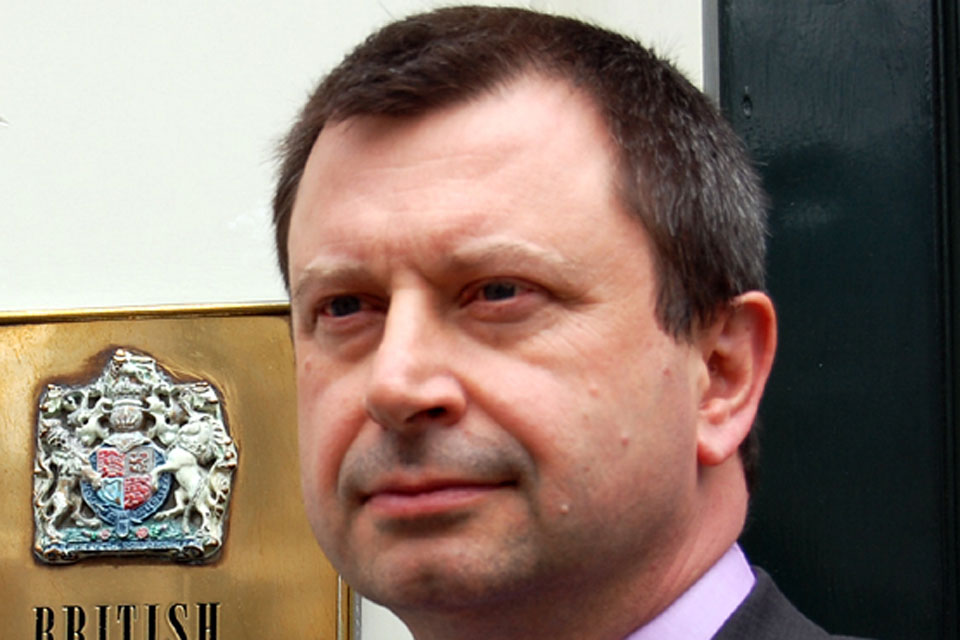Paul Thomas Arkwright, the British High Commissioner to Nigeria spoke about the UK’s commitment to do more to support Nigeria’s economic development at the London Stock Exchange on 19th April 2018.

In a speech celebrating the role of London’s capital markets in financing growth across the Commonwealth, and showcasing the UK’s commitment to driving mutual prosperity across the Commonwealth through investment, trade and jobs the High Commissioner said, “The huge success of Nigeria’s recent bond listings is further testament to this and reinforces the City of London’s position as a leading partner for raising finance, laying strong foundations on which to build our economic and financial relationship.
I’m delighted that the Lord Mayor will be speaking at this event this morning and spearheading a mission to deepen our relationship on financial and insurance services on his visit to Nigeria in a few months.”
Nigeria, economy and reform
As many of you will know, 2017 was a difficult year for the Nigerian economy. The slump in the price of oil in particular led to significant challenges in the economy, not least around the foreign exchange.
But with each crisis comes an opportunity. And the Government of Nigeria has worked hard to turn back the tide and put in place measures to promote diversification and greater ease of doing business and to make further progress on key sector reforms.
The Government has set up a new Presidential Enabling Business Environment Council (PEBEC) designed to improve the ease of doing business. And this year, Nigeria rose by 24 places in the World Bank’s Ease of Doing Business rankings. It was one of the world’s top 10 performers.
Consumer-facing industries such as telecommunications, banking, healthcare and real estate have experienced rapid expansion and can fuel the new engine of growth that Nigeria needs to take it to the next level.
The Nigerian Government is committed to addressing the scourge that is corruption. His Excellency President Buhari is personally committed to this and we have seen notable achievements in the last few years, particularly through its active engagement in the Open Government Partnership. We know more needs to be done and the UK Government is working closely with the Government of Nigeria to make progress on this – both in Nigeria and internationally, for example through the Global Forum for Asset Recovery and through our own UK Unexplained Wealth Order.
Firms often cite lack of infrastructure, red tape and high-entry costs as further obstacles to entering the market, but these are not insurmountable and the opportunities and rewards available to those who persevere are immense.
Nigeria needs an investment of US$127bn in infrastructure over the next five years. We know the scale of this challenge can sometimes be difficult to determine when based in the UK or other European countries.
Activating fresh sources of capital, both from within and outside Nigeria will be critical to help close this funding gap and the UK government is here to help.
We all know of Nigeria’s great potential: the largest economy in Africa; set to be 3rd most populous nation in the world by 2050; fertile land; abundant natural resources; and a young, energetic upwardly mobile population, with a deserved reputation for creativity and entrepreneurial spirit.
UK success stories and HMG role
UK businesses have thrived in Nigeria. Don’t take my word for it, speak to companies like BA, Shell and Unilever – who all have strong and long-established operations in Nigeria. Indeed, Unilever’s most successful global country operation is in Nigeria.
And we have seen newcomers enter the market too. Just last year Prudential entered Nigeria in recognition of the huge opportunities for life insurance with a market of this size. We expect to see more partnerships as companies seek to work with and invest in what is Africa’s largest economy and as they better appreciate the opportunities, along with the risks of working in this market. Indeed, we are working hard to increase trade ties for long-term, sustainable and mutually beneficial growth.
The Foreign and Commonwealth Office and Department for International Trade are working work with British businesses and investors to support the further strengthening and deepening of the commercial ties between the UK and Nigeria.
Our teams in the UK and in Lagos can support British companies as they are confronted by information asymmetries: our teams can help you understand where the opportunities and risks are, help you identify local partners and support your efforts in due diligence to make your entry to market a successful one. We can help you with an honest assessment of the risks and opportunities.
The UK is committed to doing even more to support the economic development of Nigeria, now and in the long-term. Our Department for International Development has an annual bilateral programme of £275m this year. Much of this is dedicated to supporting economic development and driving inclusive growth. DFID is providing support in a range of areas to reinvigorate the agricultural sector and domestic manufacturing base; boost employment opportunities and tax collection; increase transparency and remove constraints on the ease of doing business; attract quality investment and improve competitiveness.
We also have a wide range of programmes underway through the UK’s Prosperity Fund, designed to support increased investment into Nigeria, encourage economic diversification and ease the business environment by mapping the challenges at federal and state level.
From a trade perspective, our export credit agency UKEF has an outstanding finance offer for Nigerian businesses wishing to buy British products. UKEF currently has up to £750million cover for Nigeria. Nigerian businesses can get loans or guarantees when they buy British products – and the share of UK content required is only 20%. And the tenure for such loans or guarantees can be up to 18 years. We think this offer is second to none. And recently UKEF has also announced that it will provide Naira-backed guarantees for Nigerian companies buying British products in Naira. So, these companies can buy British and pay local. We are committed to ensuring that no opportunity for increased trade is thwarted for want of export finance.
As you can see, the UK government is serious about Nigeria. We are, and we will continue to be, long-term partners. Ministers from all three international departments: FCO, DIT and DFID are keenly interested in Nigeria and committed to ensuring that in Africa we continue to move from aid to trade and to contribute to job creation and wealth creation in the UK and in Africa.
Commonwealth
This event is happening in the margins of CHOGM. One of the key issues that will be discussed is free trade. This is a key issue for the UK and for Nigeria. Global trade between Commonwealth states is expected to surpass 13 trillion US dollars by 2020. These numbers reflect the sheer scale and ambition of what is happening within the Commonwealth today in terms of trade, investment and job creation.
There are huge untapped trading opportunities within the Commonwealth.
With the UK/Nigeria trading relationship currently worth more than £3 billion and more than £5 billion invested in Nigeria by UK companies, Nigeria is a much-valued Commonwealth partner. Yet it’s no secret that these figures can be improved upon greatly.
And speaking here earlier today, the UK’s Development Secretary spoke about the work SheTrades Commonwealth is doing in Nigeria, Ghana, Kenya, and Bangladesh to support women-owned businesses to participate in international trade, connecting female entrepreneurs to markets and helping them to export.
This is a fantastic initiative and looking around the room I am convinced that UK firms can and will build even stronger partnerships with their Nigerian counterparts by harnessing the energy and dynamism that characterises Nigeria today.
Future
As we exit the EU, I want to make clear that the UK remains open for business and is the same outward-looking, globally-minded, big-thinking country we have always been. Rest assured our strong economy will continue. The UK has been, and always will be a trading nation, keen on entrepreneurship and innovation – values I know both our countries hold dear.
The UK is wholeheartedly committed to supporting Nigeria’s continued ascent because a stable, secure and prosperous Nigeria means economic opportunities for British business; a safer, more secure UK, and a stable influence in Africa.
I hope that we can all work together to strengthen our political, commercial and cultural relationship for the good of our mutual prosperity.
All of us here today have a role to play in realising the wealth of opportunity and potential that Nigeria possesses, creating new markets for trade, investment and inclusive growth that will lead to a more prosperous world for us all.
Kindly follow us on twitter:@AfricanVoice2











